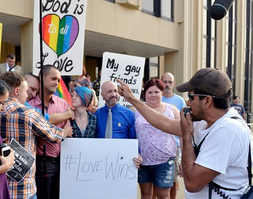In late 2014, six of the Arkansas Supreme Court's seven justices were ready to find the state's gay-marriage ban unconstitutional on federal grounds, a former justice said in an interview for the court's oral history project.
Retired Justice Donald Corbin also said five justices were ready to rule that the ban violated the state's constitution.
But the ruling was never issued by the state's top court. Gay-marriage bans in Arkansas and other states were struck down June 26 by the U.S. Supreme Court.
Corbin, whose term ended Dec. 31, was interviewed by Ernest Dumas as part of the court's oral history project. The Arkansas Times blog carried a story about the interview Tuesday.
Corbin and the six justices who served with him at the time could not be reached for comment Wednesday. No one answered at phone numbers listed for Corbin or Justice Paul Danielson. Messages left with Justices Courtney Goodson, Jo Hart and Karen Baker were not returned Wednesday, nor was one for then-Chief Justice Jim Hannah. Special Justice Robert McCorkindale also did not return a call for comment.
"It was a tough political issue, but legally it was a cakewalk," Corbin said in the interview. "Anybody who knows anything about the law or had any training whatsoever as a constitutional lawyer would know that."
In the interview, Corbin does not explicitly identify what roles the different justices played in the decision. The high court heard oral arguments Nov. 20 on an appeal of a ruling by Pulaski County Circuit Court Judge Chris Piazza, who found the ban was unconstitutional.
Corbin bemoaned the fact the state's highest court never got to settle its own law.
"The time factor there was really crowding because of the Thanksgiving holidays and the break and a two-week break in December, and then I was gone," Corbin said. "I tried to encourage [other justices] to conference over the Christmas holidays. I had an opinion ready, and I didn't think it was right for us to take a two-week vacation or a one-week vacation and not get that case out."
Corbin wasn't alone.
In the months after the Nov. 20 oral arguments, supporters of gay marriage often said they were frustrated the court hadn't issued a decision.
Many in the legal field -- including former Supreme Court Justice Bob Brown, who retired in 2012 -- felt the court should have issued a ruling, regardless of the outcome, and addressed the legal arguments specific to the state's constitution.
Corbin was succeeded by newly elected Justice Robin Wynne.
McCorkindale, the special justice appointed to the case in October 2014 by then-Gov. Mike Beebe, planned on seeing the decision through, but then the justices began to debate whether Rhonda Wood, who was also recently elected, should decide it instead of McCorkindale.
The debate resulted in a spinoff case aimed at deciding who should decide the fate of the gay-marriage ban. Hannah and Danielson recused from the spinoff case and accused a majority of the court of dragging out a decision.
Ultimately, the court ruled Wood, not McCorkindale, should take part in the decision.
But in his oral history interview in July, Corbin said he thought McCorkindale should finish the case.
"As a matter of precedent, though, I agreed with Hannah and [Danielson] that historically when a governor makes an appointment to a case ... that is an executive decision and that person stays on that case until it is decided," he said. "They changed that. Looking back, old courts would not have, because they would honor the separation-of-powers doctrine. That's the governor's deal. But [the other justices] had the votes."
The day after Danielson recused, gay-rights activist Tippi McCullough filed a complaint against the other justices, accusing them of "obfuscation and foot-dragging" in the case. On Sept. 16, the state's Judicial Discipline and Disability Commission found there was no wrongdoing.
Metro on 11/12/2015

